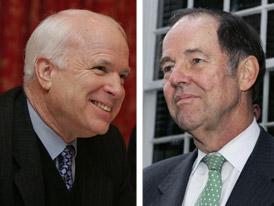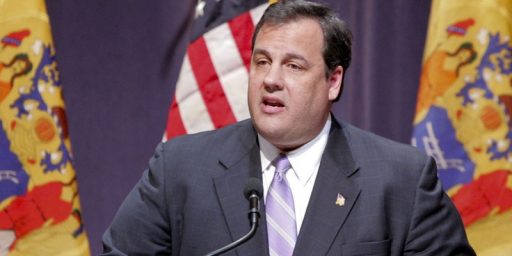Enacting the 9/11 Commission Recommendations
After some intitial hesitation, it looks as if the president and Congress will be in a race to see who acts on the 9/11 Commission’s recommendations most quickly. And the panel’s co-commissioners may be angling for the DNI job they said was necessary.
WaPo – Bush Set To Act on Advice of 9/11 Panel
President Bush plans to begin making decisions about restructuring the nation’s intelligence machinery within days and may enact some changes by executive order or regulatory action without waiting for Congress, White House officials said Sunday. Aides suggested for the first time that despite the opposition of some in the administration, Bush is headed toward backing some variation of the Sept. 11 commission’s call for a national intelligence director who would report directly to the president. Some White House officials have questioned whether the intelligence director would be considered independent if the position were under White House control. Aides said Bush is considering mechanisms to make the job less political, such as a term that does not overlap the president’s.
The commission investigating the Sept. 11, 2001, terrorist attacks on the Pentagon and World Trade Center delivered its recommendations Thursday for broad changes to intelligence agencies, and aides said Bush began reading the report on Friday as he flew to his ranch in Crawford, where he will spend the week of the Democratic National Convention. Bush will discuss the options with his national security team via videoconference on Monday, a White House official said. “We will move on all fronts very aggressively in the coming days and weeks,” the official said. “We’re going to focus on all the recommendations and determine which ones can be done through executive branch action. The president said he wants this on a fast track.”
The White House comments, a day before Democrats open their nominating convention in Boston, show what a major issue the fallout from Sept. 11 has become in the close presidential race. The urgent pace, and the White House’s willingness to discuss it, reflects the realization by Bush’s aides that he is now vulnerable to charges that he could be doing more to protect the nation against terrorism, when claiming leadership on the issue was central to his reelection strategy, Republican advisers said.
Democratic presidential candidate John F. Kerry released his plans for intelligence reform six days ahead of the commission report, and he plans to argue at the convention that he would be more effective than Bush at guarding the nation against terrorism.
Kerry sent a letter to the commission’s leaders Saturday endorsing their blueprint, calling for “immediate action” and identifying 16 recommendations on which he said the “president can act alone.” “I am committed to do all I can to make sure that your efforts will be met with action,” Kerry said in the letter.
***
The White House, which had initially responded by saying Bush would take the recommendations under advisement, is facing pressure from commission members of both parties, who are making the rounds of talk shows to say that swift work is needed and that another attack is probably coming. Republican leaders in Congress once had said they would not get to the matter until October, but said Friday that they will hold hearings in August, between the two political conventions.
Bush’s aides said that the White House staff worked over the weekend to figure out what it could do on its own, and that it was looking for changes that would not cost money and thus require authorization from Congress. Specifically, the White House is looking at the commission’s call for the creation of incentives for agencies to share intelligence about transnational terrorism, with the report saying the ” ‘need to share’ must replace ‘need to know.’ ” The White House contends the president has already taken action to tighten access to ports, airports and borders, and to crack down on terrorists’ funding sources. But the commission report says more must be done, and Bush’s aides said announcements may be made in those areas.
USA Today – In Turnaround, Congress Vows Quick Action On Reforms
Key congressional committees will begin crafting new laws this week aiming to create a national intelligence director and counterterrorism center, initiatives proposed by the commission that investigated the 9/11 attacks. The quick reaction to the commission’s final report represents a surprising turnaround by congressional leaders, who late last week said there would be no time this year to approve the recommendations. But on Friday, House and Senate committees were directed to give up some of their August vacations and start work immediately so that legislation can be drafted by the end of September. A special fall session of Congress is also possible.
At the same time, President Bush is studying the recommendations this week at his ranch in Crawford, Texas, aides said, and is considering which ones can be implemented by executive order, without the need for congressional approval.
Political considerations may have fueled the sudden urgency in Congress. Bush and Republican congressional leaders “all worry that if they appear to be dragging their feet on the 9/11 Commission reforms, they could be put on the defensive on the terrorism issue in November, especially if there is another attack,” says Thomas Mann, a congressional scholar at the Brookings Institution. “Just what gets enacted is another matter.”
It is very unusual for the findings of a blue ribbon panel to actually be enacted into legislation but this may well be an exception, owing to the emotional impact of 9/11. Making decisions of this magnitude during the heat of a tight presidential race, motivated mostly by the pressure of a public that has no expertise on the matter, is an inherently bad idea. It is, unfortunately, the price one pays for regular, fixed elections.
Update (1059): I missed this bit of news yesterday in that, even though I TiVo’d and watched MTP, I fast forwarded through the interviews with Kean and Hamilton because, frankly, I’m tired of seeing them every five minutes:
Kean and the panel’s vice chairman, Lee H. Hamilton, asked on NBC’s “Meet the Press” whether they would consider jointly running the new intelligence agency, appeared to welcome the idea.
“I’d do anything with Lee Hamilton,” Kean said. “We’ve established a partnership here that is — ”
“Extraordinary,” Hamilton interjected.
“Extraordinary,” Kean repeated.
“I’d have to think about it,” Hamilton said. “I’ve had a marvelous experience working with Tom Kean, and I think it’s been a productive one, but that’s a presidential call.”
I ignored that passage as silliness when I first read the WaPo piece, but the New York Times seems to think it a real possibility.
Update (1224): Drezner gets results!





